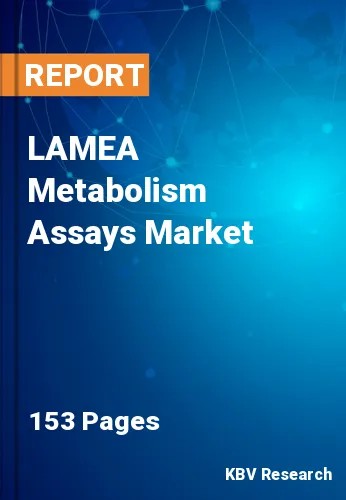The Latin America, Middle East and Africa Metabolism Assays Market would witness market growth of 10.7% CAGR during the forecast period (2023-2030).
In the era of personalized medicine, metabolism assays are used to assess an individual's metabolic profile. This information can guide treatment decisions, helping healthcare providers select the most effective drugs and dosages based on a patient's unique metabolism. These are applied to evaluate the metabolic impact of different diets, nutrients, and dietary supplements. They help researchers understand how various factors influence metabolism and overall health. Metabolism assays are used in biotechnology to optimize the production of bio-based products, such as biofuels, enzymes, and biopharmaceuticals.
It can diagnose metabolic disorders and monitor disease progression in clinical laboratories. For example, blood glucose assays are commonly used to diagnose and manage diabetes. These are applied in agriculture to improve crop yield and quality. They are also used in environmental research to assess the impact of pollutants and environmental factors on living organisms. Researchers studying stem cells and regenerative medicine use metabolism assays to understand how cells differentiate and function. These assays help in developing cell-based therapies. These are utilized to study the metabolic responses of pathogens and host cells during infections.
LAMEA has a significant burden of metabolic disorders such as diabetes, obesity, and cardiovascular diseases. The need for early detection, monitoring, and management of these conditions drives the utilization of metabolism assays. Diabetes is a major health concern in many nations within the LAMEA region. Moreover, the prevalence of obesity is on the rise in several LAMEA countries. The growing numbers of diabetes in South Africa has indeed played a vital role in driving the growth of the market. These factors will expand the market growth in this region.
The Brazil market dominated the LAMEA Metabolism Assays Market by Country in 2022, and would continue to be a dominant market till 2030; thereby, achieving a market value of $40.2 million by 2030. The Argentina market is showcasing a CAGR of 11.3% during (2023 - 2030). Additionally, The UAE market would register a CAGR of 10.4% during (2023 - 2030).
Based on Product, the market is segmented into Assay Kits & Reagents and Instruments & Analyzers. Based on Application, the market is segmented into Diagnostics (Diabetes, Obesity, Cardiovascular Diseases, Cancer and Others) and Research. Based on Technology, the market is segmented into Colorimetry, Fluorimetry and Spectrometry. Based on End User, the market is segmented into Hospitals, Diagnostics Laboratories and Pharmaceutical & Biotechnology Companies and CROs & Academic Research Institutes. Based on countries, the market is segmented into Brazil, Argentina, UAE, Saudi Arabia, South Africa, Nigeria, and Rest of LAMEA.
Free Valuable Insights: The Worldwide Metabolism Assays Market is Projected to reach USD 2.5 Billion by 2030, at a CAGR of 7.7%
The market research report covers the analysis of key stake holders of the market. Key companies profiled in the report include Merck KGaA, Thermo Fisher Scientific, Inc., Abcam Plc, Agilent Technologies, Inc, Promega Corporation, Kaneka Eurogentec S.A (Kaneka Corporation), RayBiotech Life, Inc, Sartorius AG, Elabscience Biotechnology Inc. and Bmg Labtech GmbH.
By Product
By Application
By Technology
By End User
By Country
Our team of dedicated experts can provide you with attractive expansion opportunities for your business.

